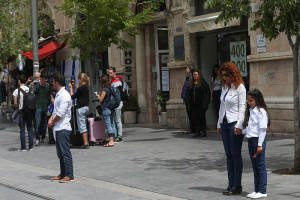
By Rabbi Moshe Rothchild
“The state will not be given to you on a silver platter.” These words were spoken in December 1947 by Chaim Weizmann, who would serve as Israel’s first president.
Israelis are now observing Yom Hazikaron, which is Israel’s Memorial Day, when we remember those who fell in war or as victims of terror. It is not a beach day or a day for fun and barbecues.
It is solemn, serious and in many ways a very sad day. The TV and radio broadcasters select stories of our heroic soldiers who lost their lives in defense of the State of Israel. Israel is a very small country and everyone knows someone who fell in battle. As Yom Hazikaron ends in the evening, the solemnness will transform into joy and partying as we celebrate Yom Ha’atzmaut, Israel’s Independence Day.
The contrasting feelings of these two days was generated intentionally and with great insight. No one should ever take for granted what they have been given. Memory is not a stand-alone concept. We remember in order to learn the lessons of the past and to appreciate what it took to arrive at the present. The very ground that we walk on is steeped in rich history and in self-sacrifice.
When the State of Israel was declared in 1948, David Ben Gurion, who would become the first prime minister, knew that we would have to defend the new state immediately. He knew the Arab countries were not bluffing when they threatened to attack collectively if a new state was declared.
When Golda Meir, who later became an Israeli prime minister, visited the US a few months before the Jewish state was declared, she said: “A Jewish state will exist in Palestine. We shall fight for its birth. That is natural. We shall pay for it with our blood. That is normal. The best among us will fall, that is certain. But what is equally certain is that our morale will not waver no matter how numerous our invaders may be.”
Pushed by the Past, Pulled by the Future
They knew what it would take to restore the Jewish people to their ancient homeland and were willing to pay the price. Why? Because they were deeply aware of the historical road that the Jewish people had traveled on since the destruction of the Temple by the Romans nearly 2000 years prior.

Israelis in Jerusalem stand still as a two-minute siren sounds across Israel. (Nati Shohat/Flash90)
They knew that the exile, the Diaspora, had not been kind to their ancestors. Whether they were motivated by religious reasons or the thought that a Jewish state would end anti-Semitism does not matter. They all understood the awesome opportunity that history had given them. They were not fighting on their own—they were being pushed by the past and pulled by the future.
“The state will not be given to you on a silver platter.” These words were spoken in December 1947 by Chaim Weizmann, who would serve as Israel’s first president. In reaction to this statement, a gripping poem was written by premier Israeli writer Natan Alterman and published in an Israeli paper. I am sharing only part of it here. Please read it carefully, it is very moving.
Dressed in battle gear, dirty, Shoes heavy with grime, they ascend the path quietly
To change garb, to wipe their brow
They have not yet found time. Still bone weary from days and from nights in the field
Full of endless fatigue and unrested,
Yet the dew of their youth. Is still seen on their head
Thus they stand at attention, giving no sign of life or death
Then a nation in tears and amazement
will ask: “Who are you?”
And they will answer quietly, “We Are the silver platter on which the Jewish state was given.”
Thus they will say and fall back in shadows
And the rest will be told In the chronicles of Israel
Today we remember the “silver platter” upon which we received the State of Israel. We bring the fallen soldiers out of the shadows of the past and bring their stories to light.
The underlying theme of memory is gratitude. We must remain grateful to the soldiers and all who have given their life for the State of Israel and to those who fight for freedom everywhere in the world.






















